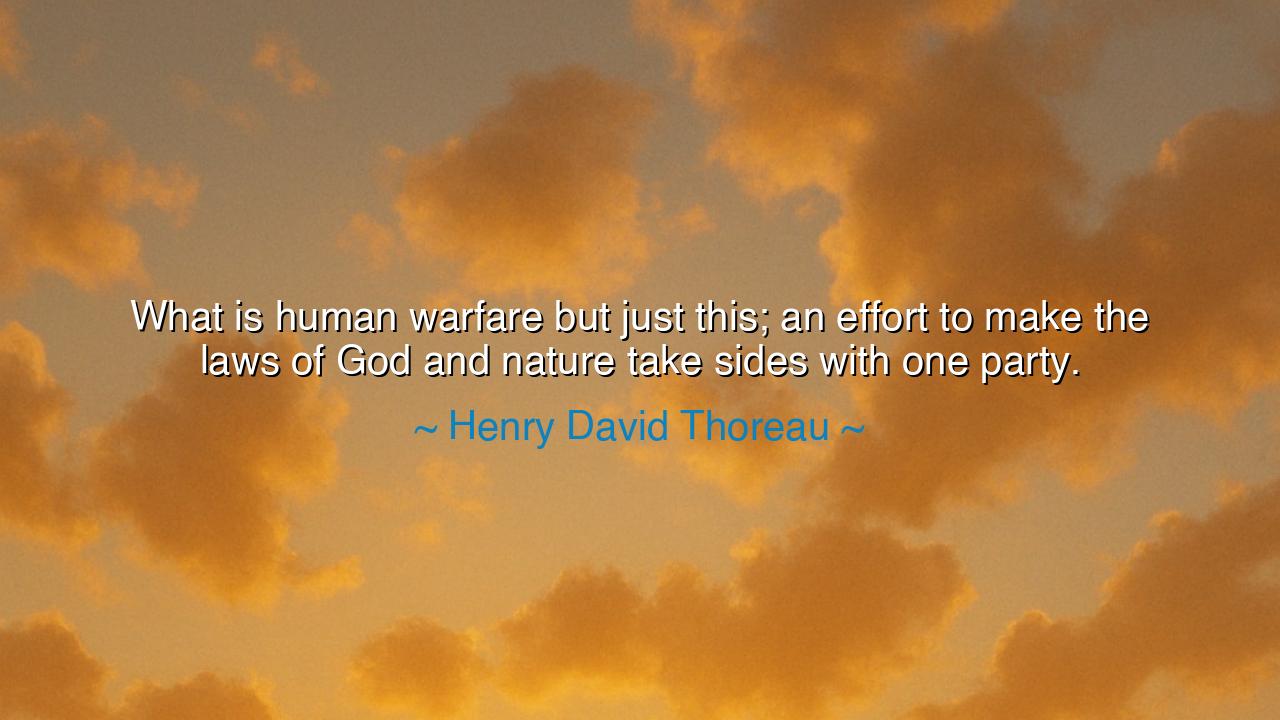
What is human warfare but just this; an effort to make the laws
What is human warfare but just this; an effort to make the laws of God and nature take sides with one party.






When Henry David Thoreau declared, “What is human warfare but just this; an effort to make the laws of God and nature take sides with one party,” he pierced to the heart of mankind’s greatest folly. In these words, the philosopher of Concord unmasks the illusion of war. He shows us that men, when they march into battle, believe not only in the strength of their armies but also in the righteousness of their cause. Each side cries out that God and nature stand with them, that their banners are sanctified by heaven and their swords are sharpened by destiny. Yet, in truth, war is not the alignment of heaven with earth, but the presumption of mortals, each striving to force eternal law into the service of their own ambitions.
This insight springs from Thoreau’s deep meditation on nature and morality. He walked among forests and rivers, seeing in them an order that transcends human strife. To him, nature was impartial, neither favoring the soldier who advances nor the one who retreats. The storm rains on both armies; the sun rises upon friend and foe alike. And yet, blinded by pride, men claim that the very order of the universe bends toward their side. Thoreau calls this not truth, but delusion, for the cosmos does not take sides in quarrels born of human greed and vanity.
History resounds with examples of this delusion. In the Crusades, both Christian knights and Muslim warriors cried that God’s will sanctified their blades. Both prayed for victory, both claimed the heavens as their ally, and both shed rivers of blood upon the earth. Yet could the eternal truly belong to one camp alone? The suffering of the widows and orphans was the same, whether the cross or the crescent triumphed. Here we see Thoreau’s wisdom: war is but an attempt to conscript the divine, to make God and nature appear partial when in truth they remain beyond human divisions.
The ancients too glimpsed this truth. In the tragedies of Euripides, we hear the lament of women of Troy, crushed between warring powers, each side claiming justice. The gods, invoked by both armies, appear silent. The playwright shows us that while men contend, it is often the innocent who bear the weight of their presumption. Thoreau’s words echo this ancient lament: that war is not the triumph of divine justice, but the striving of mortals to paint their own violence with sacred colors.
Yet his words are not only condemnation, but also instruction. For if we understand that God and nature do not take sides, then we must also understand that war, at its root, is the failure of human beings to see their shared place beneath the same sun, upon the same earth. The same laws of nature sustain both friend and foe. The same mortality binds both victor and vanquished. War, then, is revealed as a failure to honor this common bond, an exaltation of pride over humility, and of division over unity.
The lesson for us is clear: beware of the voice that claims heaven’s blessing for violence. Be cautious when men drape their causes in the mantle of eternity, for often what they pursue is not justice, but power. Instead, strive to see the shared humanity beneath conflict. Remember that nature is impartial, and that the true laws of God call for mercy, justice, and peace—not slaughter in His name.
Practically, let each one of us live this teaching by seeking reconciliation over strife in daily life. When tempted to force our own way upon others, ask: “Am I truly serving justice, or merely my own pride?” When leaders cry that heaven endorses their wars, weigh their claims against the impartial witness of nature. And in our own disputes, let us not seek to conscript the eternal to our side, but to walk humbly in recognition of our shared condition.
Thus Thoreau’s words, though born in the quiet of the 19th century, resound with the force of prophecy: war is not the voice of God or nature, but the echo of human arrogance. If we would be wise, let us cease trying to make heaven serve our battles, and instead strive to make our lives serve the higher laws of heaven. In this way, peace may yet take root where blood once flowed, and unity may triumph where division once reigned.






AAdministratorAdministrator
Welcome, honored guests. Please leave a comment, we will respond soon